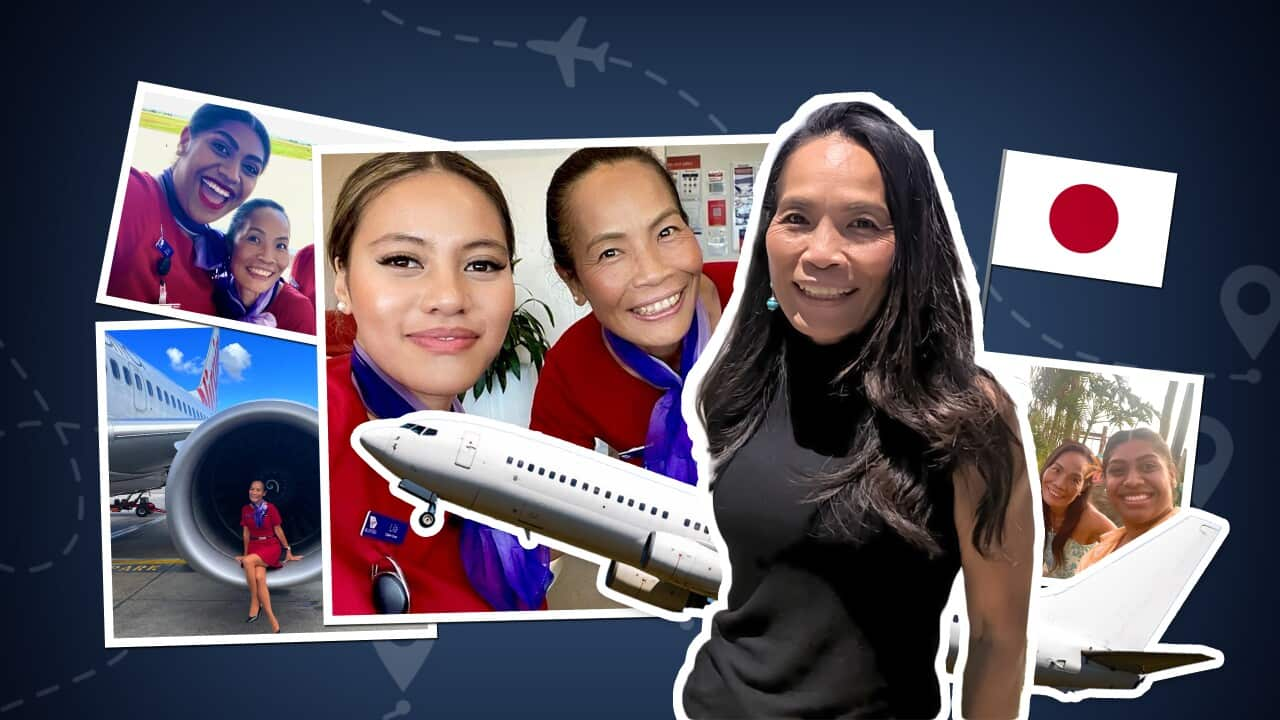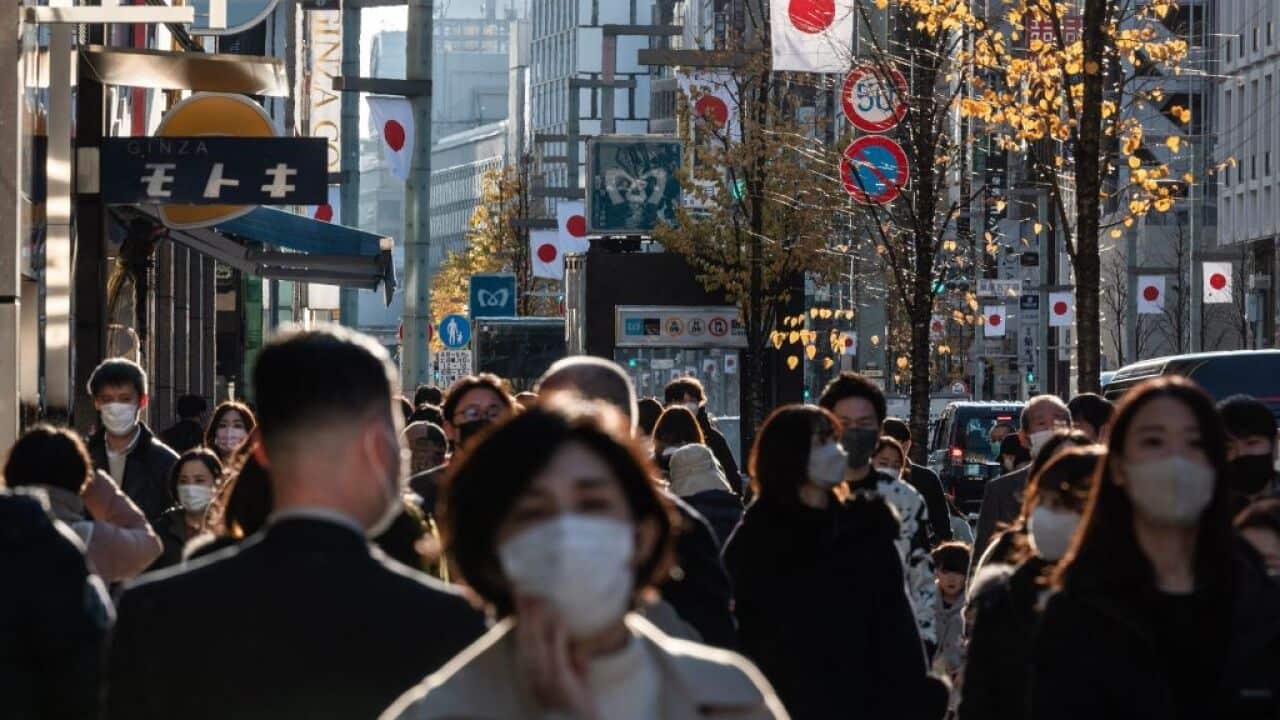Key Points
- Chiharu Ito, 56, recently became an air cabin crew member.
- Unlike in Japan, she did not fear she would be considered ‘too old for the job’ in Australia.
- Australia and Japan have different approaches to age in the workplace, she says.
When Chiharu Ito applied for a cabin crew position with an Australian airline recently, she was confident of getting a "fair go".
"I had no previous aviation experience. I had applied from Japan. And I was 56 years old," she told SBS Japanese.
Her belief in her own skills ultimately paid off.
“My childhood dream has come true after 50 years,” she said.

Chiharu Ito says she grew up watching TV series that glamorised the job of flight attendant. Credit: Chiharu Ito
A childhood dream
When Chiharu was five, she recalled writing “I want to be a stewardess” on a wishing card during the Star Festival (Tanabata).
As part of this old Japanese custom, people decorate bamboo branches with pieces of colourful paper and small cards on which they have written a poem or wish.
Many small kids might express their wish to become a professional baseball player, princess, fire-fighter or beautiful bride.
Some girls were drawn to the glamourous flight attendants depicted in TV series, but she simply had a “longing for foreign countries”.
“If I became a cabin crew member, I didn’t need to be rich to go overseas,” she said.
Later, she tasted disappointment when she learned she wasn't deemed tall enough to apply for many cabin crew roles in Japan.
Finding her 'real calling'
Instead, Chiharu became a primary school teacher. She enjoyed teaching children, which she called her ”real calling.”
But a curiosity about the world led her to become a working holiday-maker in Australia when she was 20 years old. After that, she worked both overseas and in Japan as a teacher.
From 2011, Chiharu lived in Australia for seven years, enjoying the beach life as a surfer and making many friends in Sydney.
Five years ago, she had to return to Japan to look after her ill father. After initially struggling to get a job, she eventually landed a teacher role at an international school.

Chiharu Ito says her new career has been very rewarding. Credit: Chiharu Ito
“Hey, check it out. You can come back to Australia,” the email read. Attached was the recruitment information for an air cabin crew position with Virgin Australia.
The airline had just started to fly to Japan.
I thought to myself, 'I know about both Australia's friendly culture and Japanese omotenashi (selfless hospitality culture). It’s my job!'Chiharu Ito
While Chiharu’s beloved father passed away a few years ago, she was reluctant to leave Japan as her mother was in aged care.
However, her sister, Miyuki Yumoto, put her mind at ease.
"As her sister, I wanted to support her decision – to challenge her to a new job even though she is 56 years old," Miyuki said.
“I didn’t worry about her as I knew she is strong-minded like our father."
Approaches to age
In Australia, it is illegal for an employer to ask your age, marital status, religion or nationality, so you don’t need to write these down on your CV.
By comparison, Chiharu said Japanese CV templates are almost always identical, and include an age section, as the government recommends the format for “fair employment".
While it's illegal to limit a job by age in a recruitment ad in Japan, it is not illegal for an employer to ask a candidate's age.
Chiharu said she feels the Australian way is "fairer".
“They didn’t know how old I was until I came to Australia,” Chiharu said.
After passing the first document and video exam, she moved to Sydney for training.
That's when she encountered another "fateful moment". Struggling to find a place to live amid a housing shortage, she bumped into an acquaintance at a cafe who helped her find a room that very day with the aid of a neighbour.
All she had to do now was survive six weeks of “ground school” training, "mostly on security and safety". If she failed any of the weekly exams, it would spell the end of her dream.
She said her strong will supported her through these stressful days.
I did not think about failure. I just decided I would become a cabin crew member!Chiharu Ito

Chiharu Ito's training graduation. Credit: Chiharu Ito
“Once work started, I felt so happy because every flight there are passengers who thank me when they get off the plane," she said.
“One day, I bumped into one of the passengers at a hotel - she even remembered my name.”
Job market differences between Australia and Japan
Chiharu believes that landing her dream job would not have been possible in her homeland.
According to the Australian government occupation profile, the average age of a cabin crew member in Australia is 38 years old, while in Japan it's 41.8 years old, as per the Occupational Information Site run the Ministry of Health, Labor and Welfare.
But these numbers only tell part of the story, with both countries grappling with addressing age barriers to work.
Australia's Age Discrimination Act 2004 (ADA) prohibits discrimination in employment on the basis of age.
However, a released by the Australian Human Rights Commission (AHRC) found most Australians (90 per cent) agree ageism exists in Australia, with 83 per cent agreeing ageism is a problem and 65 per cent saying it affects people of all ages.
Japan also has the Employment Measures Act, which says “an employer must provide workers with equal opportunities in recruitment and hiring, regardless of their age”.
The country's low birthrate and shrinking workforce mean employment opportunities for older people have risen.
According to the Statistics Bureau of Japan, the number of elderly workers (65 years old or older) has increased for 19 consecutive years, reaching a record high of 9.12 million in September 2023.
Shufu JOB Research Institute is an organisation in Japan that conducts research into men and women looking to balance their work and family lives.
In 2023, they carried out a survey of 649 of women who were looking for a job. According to the research, many people felt they were disadvantaged by their age, especially in the older age bracket.

Research of whether people felt disadvantaged because of their age in Japan. Source: Shufu JOB Research Institute (translated to English by SBS Japanese)
“As soon as I turned 50, I was rejected from the application screening. It's a job I've been doing for years, and I feel very anxious,” one survey participant said.
Another respondent in her 70s said, “I wish to see the elimination of situations where people with a lot of experience are not even given an interview. I wish to see the situation that the recruiter sees more of a candidate’s personality and career.”
Miyuki, Chiharu's sister, said job hunting could be challenging for older women in Japan.
“It is difficult for women in their 50s to find or change a job. Once you finish raising your own child, you want to work again. However, even though it might be the same industry you worked in before, your skills tend to be ignored," she said.
"Aged care or childcare always has a shortage of workers, so you can find those jobs. But the wage is really low,“ she added.
'Don’t give up'
For now, Chiharu's just happy to be doing what she loves.
Her advice for others: "Don't give up. Don't set an age limit. You might say, ‘because of my age, I cannot do this’. I can understand the social pressure in Japan. But Australia is different.”
Just focus on what you want to do. Study for it and try for it.Chiharu Ito
Listen to SBS Japanese Audio on Tue, Thu and Fri from 1pm on SBS 3.
Replays from 10pm on Tue, Thu and Sat on SBS1.
Listen to past stories from our

